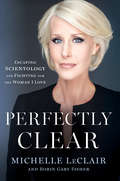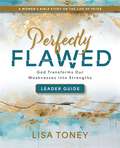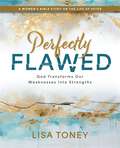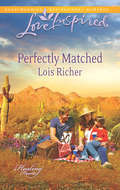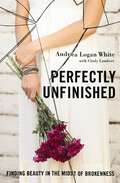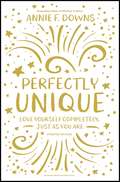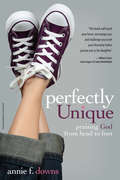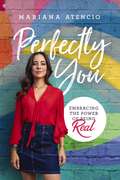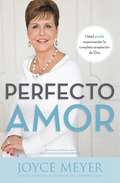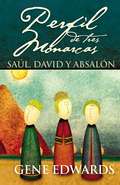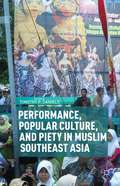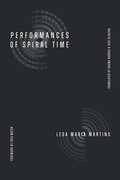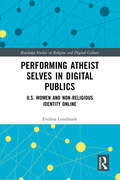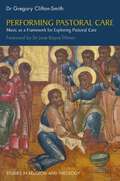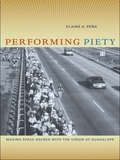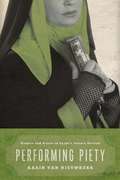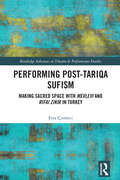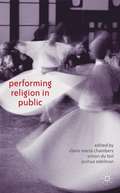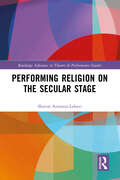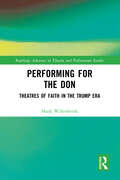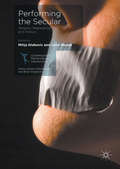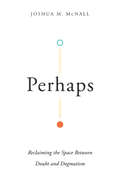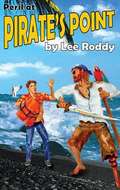- Table View
- List View
Perfectly Clear: Escaping Scientology and Fighting for the Woman I Love
by Robin Gaby Fisher Michelle LeClairThe revelatory memoir by former "poster girl for Scientology" Michelle LeClair about her defection from the Church, her newly accepted sexual identity, and the lengths to which Scientology went to silence it.For years, Michelle LeClair, former President of Scientology's international humanitarian organization, tried to reconcile her sexual orientation with the anti-gay ideology of the church. Michelle finally ends her horrific marriage, finds the love of her life, a woman, and ultimately leaves the Church. But the split comes at a terrible price. Her once pristine reputation is publicly dragged through the mud, the police raid her home, her ex-husband tries to gain full custody of their children, and the multi-million dollar business she built from scratch is utterly destroyed. In this tell-all memoir, Michelle offers an insider's perspective on Scientology's pervasive influence, secret rituals, and ruthless practices for keeping members in line. It's a story of self-acceptance, of finding the strength and courage to stand up for your emotional freedom, and of love prevailing.
Perfectly Flawed Women's Bible Study Leader Guide: God Transforms Our Weaknesses into Strengths (A Women’s Bible Study on the Life of Peter)
by Lisa ToneyWe are all flawed, but God can turn those weaknesses into strengths.The Perfectly Flawed Leader Guide outlines six small group sessions complete with prayers, summaries, discussion questions, and video viewer guides. The leader guide will support group leaders of all experience levels in creating strong learning communities.In Perfectly Flawed, Lisa Toney shows how the apostle Peter’s passion and imperfections make him one of the Bible’s most loved and relatable people. Even when Peter gave up, gave in, and gave out, Jesus was there for him. Join Lisa as she follows Peter through his time with Jesus, from the beginning of Jesus’s ministry to the Resurrection and on through Pentecost when Peter begins to live into his call. Along the way, discover the raw honesty of a man who veered from staunch devotion to moments of doubt, mirroring our own human struggles.In the six-week Bible study Perfectly Flawed, we see that there is an unparalleled power Jesus gives that can only be found in our weakness. We discover the strength of Jesus that is available to each of us. Learn to persevere in your faith, live confidently, and boldly step into God’s purpose for you. See how Peter’s story is an invitation to embrace imperfection, find strength in the relentless grace of God, and discover how each one of us is perfectly flawed but still deeply loved by God.Other components for the Bible study include a Participant Workbook with daily readings and teaching video available on DVD.
Perfectly Flawed Women's Bible Study: God Transforms Our Weaknesses into Strengths (A Women’s Bible Study on the Life of Peter)
by Lisa ToneyWe are all flawed, but God can turn those weaknesses into strengths. The apostle Peter’s passion and imperfections make him one of the Bible’s most loved and relatable people. Even when Peter gave up, gave in, and gave out, Jesus was there for him. Join Lisa Toney as she follows Peter through his time with Jesus, from the beginning of Jesus’s ministry to the Resurrection and through Pentecost, when Peter begins to live into his call. Along the way, discover the raw honesty of a man who veered from staunch devotion to moments of doubt, mirroring our own human struggles. In the six-week Bible study Perfectly Flawed, we see that there is an unparalleled power Jesus gives that can only be found in our weakness. We discover the strength of Jesus that is available to each of us. Learn to persevere in your faith, live confidently, and boldly step into God’s purpose for you. See how Peter’s story is an invitation to embrace imperfection, find strength in the relentless grace of God, and discover how each one of us is perfectly flawed but still deeply loved by God. The participant workbook includes five daily readings for each week, combining the study of Scripture with personal reflection, application, and prayer. Other components for the Bible study include a Leader Guide and teaching video available on DVD.
Perfectly Matched
by Lois RicherSafe HavenFormer model Shay Parker has come home to Hope, New Mexico, seeking refuge from the nightmares that haunt her. Then she runs into childhood friend Nick Green. Rugged former football star Nick is the only one who makes Shay feel safe again. But he's dealing with problems of his own, and Shay is more than willing to help care for his orphaned niece and aging mother. When Nick suddenly makes plans to leave Hope for a new job, what will become of the trust they've built? Can they look beyond the pain of their scarred pasts to trust the healing power of love?
Perfectly Unfinished: Finding Beauty in the Midst of Brokenness
by Cindy Lambert Andrea Logan WhiteAndrea Logan White appeared to be living the “American dream” or what many would call a “perfect life.” However, underneath the happy veneer of the model, actress, and producer, was a subtle, caustic voice leading to emptiness and self-destruction. She was being crushed under the weight of her own drive for “perfection.” Andrea’s remarkable (and often tabloid-worthy) journey that took her from hanging out in the Playboy mansion to finding God at a stop light on Hollywood Boulevard is a page-turner, but it is not the whole story.Even discovering Jesus, finding an amazing husband, having beautiful children, and embarking on an exciting career didn’t hold the “happily ever after” Hollywood ending Andrea had envisioned. No matter how successful, how spiritual, how loved, she was still enslaved by a lie the Enemy uses against many of us: she felt she needed to be “perfect” to be accepted by herself, by others, and by God.Andrea shares her struggle with life-threatening eating disorders and self-defeating thought patterns, and she reveals the beautiful discovery that God’s love meets us not in our perfection, but in the most unfinished places of our life. In Perfectly Unfinished, Andrea exposes the powerful truth that continues to change her life: God loves us just as we are, just where we are; for it is in the midst of our brokenness and imperfections that Jesus is at work completing us so that we may share fully in his holiness.Alongside Andrea, readers discover from the word of God how to join God in the work he is doing in the midst of our unfinished and imperfect lives.
Perfectly Unique: Love Yourself Completely, Just As You Are
by Annie F. DownsSTOP wishing your body was something it’s not.START embracing every part of you just as it was designed.Your body is a sacred treasure, a worshipful instrument, and a unique masterpiece!That’s a pretty big deal.But sometimes it feels confusing, awkward, and flawed.The truth is: You and your body, all of it, are important and beautiful, designed especially by God with a specific plan and purpose. Each chapter in Perfectly Unique focuses on a different part of your body and the potential it has for helping grow your faith. With wisdom and compassion, author Annie F. Downs will help you:Stop being so hard on yourselfStop wishing you were designed differentlyStop comparing yourself to othersStop criticizing the young woman you see in the mirror every daySTART honoring yourself insteadUltimately, Perfectly Unique will not only help you understand the reasons God made you the way you are, it will empower you to embrace and celebrate (YES, celebrate!) each and every part of you.
Perfectly Unique: Praising God from Head to Foot
by Annie F. DownsYour body is an instrument. No, it’s not a flute, or a guitar (I hope). It is a sacred and original design by a master craftsman with a specific plan and purpose. That’s a pretty big deal. From head to foot, the way you view your body is directly connected to how you serve God. Seriously. From the thoughts you think to the steps you take, every part of you is linked to the divine. Perhaps you are struggling with your body image or are trying to make sense of why God made you as you are. Maybe you are looking for new ways to understand Scripture or to love God more fully. Either way, this book will take you on a thoughtful, funny, and spirit-filled exploration of the way you were designed and will help you better honor the Creator by learning to value his perfectly unique creation (yourself!).
Perfectly You: Embracing the Power of Being Real
by Mariana AtencioIn this much-needed book, which is part self-help and part autobiography, award-winning correspondent Mariana Atencio digs into what makes each of us special and the ways in which we can become a force for good in a broken world.As a bilingual correspondent for NBC News, Fusion TV, and Univision, Mariana holds a unique perspective—having immigrated from Venezuela to America as a young adult, having overcome challenges to graduate from Columbia University and eventually become a national news correspondent, and having seen firsthand the humanity that is ever so present in the midst of both adversity and opportunity.Mariana’s story is the powerful, inspiring story of life in the United States as an immigrant. Yet it is at its core a human story. It is all of our stories, and it is a call to every man, woman, and child to unlock the magic of their potential and begin to thrive.The media screens of today perpetuate stereotypes, but what would happen if instead of comparing ourselves and falling short, we compared ourselves and celebrated our uniqueness? What would happen if we believed in our worth and embraced what makes us different? And what if we truly saw those around us as neighbors and not merely adversaries to our particular group or station?The days of doubt and division must end. It starts with authenticity, persistence, and understanding what truly makes you special.
Perfecto amor: Usted puede experimentar la completa aceptaci¿n de Dios
by Joyce MeyerAyer. Hoy. Mañana. Dios te ama perfectamente, todo el tiempo. Pero si a veces te sientes indigno, desconfías de ti mismo o crees que Él está enojado contigo, Joyce Meyer, la autora de éxitos de ventas número 1 del New York Times, quiere ayudarte a entender la verdad poderosa de que Dios te acepta totalmente. No importa lo que hayas hecho o dónde te encuentres en el viaje de tu vida, tú estás destinado a recibir este regalo. La Palabra de Dios declara que su amor por ti no cambia y Él te ama simplemente porque así lo desea. En Perfecto amor, Joyce revela cómo se puede desarrollar la certeza de que Dios te ama completamente y sin condiciones, ahora mismo. Combinando su propia experiencia personal con conocimiento bíblico, Joyce te ayudará a aumentar tu comprensión del carácter genuino de Dios para que puedas vivir plenamente, disfrutar de un sentido de confianza duradera y experimentar su amor en un nivel completamente nuevo. Algunos títulos de los capítulos son: Aprender a ver claramente; Ser la persona que Dios quiso que fueras tu potencial; Sorprendente gracia; and Sentirse cómodo con Dios."¡Dios te ama perfectamente y sin condiciones en este momento!" -Joyce Meyer
Perfil de tres monarcas: Saúl, David y Absalón
by Gene EdwardsEstudio sobre el Quebrantamiento, la Sumisión y la Autoridad. Este bello, sencillo y enérgico relato, narrado por uno de los mejores novelistas norteamericanos, se convirtió en drama, representado por actores profesionales en el teatro y por aficionados en los templos. Algunos pastores han leído a sus congregaciones todo el relato desde el púlpito. Varios líderes cristianos y directores de movimientos religiosos han animado a sus miembros y a sus empleados en todo el mundo a que lean este libro. Por toda la tierra los cristianos han sidos ayudados, consolados y sanados del dolor, el daño y la angustia que han sufrido como resultado de un tratamiento injusto por parte de otros creyentes. Este libro es extraordinariamente útil para motivar a la reflexión y discusión en reuniones de pastores y otros líderes espirituales sobre el liderazgo aprobado por Dios.
Performance, Popular Culture, and Piety in Muslim Southeast Asia
by Timothy P. DanielsThe Muslim-majority nations of Malaysia and Indonesia are known for their extraordinary arts and Islamic revival movements. This collection provides an extensive view of dance, music, television series, and film in rural, urban, and mass-mediated contexts and how pious Islamic discourses are encoded and embodied in these public cultural forms.
Performances of Spiral Time (Dissident Acts)
by Leda Maria MartinsIn Performances of Spiral Time, famed Afro-Brazilian thinker Leda Maria Martins theorizes forms of African and African diasporic temporality, corporeality, and space that exist apart from and critique Eurocentric notions of linear time. Martins introduces the notion of “spiral time”—curved and recurrent temporalities materialized in Black corporealities in which the body is the place of the inscription of memory and knowledge. She draws on African and African diasporic philosophy as well as the ritual performance and quotidian practices of Afro-Brazilians, arguing that spiral time is most powerfully expressed by the moving body. Embodied performance—whether manifested as capoeira, Candomblé, or theater—and the influence of oral traditions, sacredness, and ancestrality, cause time and memory to curve and return. With this theorization, Martins not only counters the claim to dominance of Western linear time; she provides a polyvalent and foundational account of African and African diasporic thought and ontology.
Performing Atheist Selves in Digital Publics: U.S. Women and Non-Religious Identity Online (Routledge Studies in Religion and Digital Culture)
by Evelina LundmarkThis book considers how the non-religious self is performed publicly online, and how digital culture and technology shapes this process. Building on a YouTube case study with women vloggers, it presents unique empirical data on non-organized atheism in the United States. Lundmark suggests that the atheist self as performed online exists in tension between a perception of atheism as sinful and amoral in relation to hegemonical Christianity in the U.S., and the hyperrational, male-centered discourse that has characterized the atheist movement. She argues that women atheist vloggers co-effect third spaces of emotive resonance that enable a precarious counterpublicness of performing atheist visibility. The volume offers a valuable contribution to the discussion of how the public, the private, and areas in-between are understood within digital religion, and opens up new space for engaging with the increased visibility of atheist identity in a mediatized society.
Performing Orthodox Ritual in Byzantium
by Andrew Walker WhiteIn this groundbreaking, interdisciplinary study, Andrew Walker White explores the origins of Byzantine ritual - the rites of the early Greek Orthodox Church - and its unique relationship with traditional theatre. Tracing the secularization of pagan theatre, the rise of rhetoric as an alternative to acting, as well as the transmission of ancient methods of musical composition into the Byzantine era, White demonstrates how Christian ritual was in effect a post-theatrical performing art, created by intellectuals who were fully aware of traditional theatre but who endeavoured to avoid it. The book explores how Orthodox rites avoid the aesthetic appreciation associated with secular art, and conducts an in-depth study (and reconstruction) of the late Byzantine Service of the Furnace. Often treated as a liturgical drama, White translates and delineates the features of five extant versions, to show how and why it generated widely diverse audience reactions in both medieval times and our own.
Performing Pastoral Care: Music as a Framework for Exploring Pastoral Care
by Gregory Clifton-Smith June Boyce-TillmanMaking the case for the relevance of pastoral care today, this book explores the role of pastoral care through the prism of music. Using musical analogies, the author provides a new way of understanding and practising pastoral care, grounded in practical theology. Challenging overemphasis on mission, he shows that pastoral care remains essential to the life of the church, especially when engaging with extreme situations such as dying, suffering or war, and considers the role of pastoral carers in the specific pastoral encounter and in the life of the church in general.
Performing Piety: Making Space Sacred with the Virgin of Guadalupe
by Elaine A. PeñaThe Virgin of Guadalupe, though quintessentially Mexican, inspires devotion throughout the Americas and around the world. This study sheds new light on the long-standing transnational dimensions of Guadalupan worship by examining the production of sacred space in three disparate but interconnected locations--at the sacred space known as Tepeyac in Mexico City, at its replica in Des Plaines, Illinois, and at a sidewalk shrine constructed by Mexican nationals in Chicago. Weaving together rich on-the-ground observations with insights drawn from performance studies, Elaine A. Peña demonstrates how devotees' rituals--pilgrimage, prayers, and festivals--develop, sustain, and legitimize these sacred spaces. Interdisciplinary in scope, Performing Piety paints a nuanced picture of the lived experience of Guadalupan devotion in which different forms of knowing, socio-economic and political coping tactics, conceptions of history, and faith-based traditions circulate within and between sacred spaces.
Performing Piety: Singers and Actors in Egypt's Islamic Revival
by Karin Van NieuwkerkIn the 1980s, Egypt witnessed a growing revival of religiosity among large sectors of the population, including artists. Many pious stars retired from art, "repented" from "sinful" activities, and dedicated themselves to worship, preaching, and charity. Their public conversions were influential in spreading piety to the Egyptian upper class during the 1990s, which in turn enabled the development of pious markets for leisure and art, thus facilitating the return of artists as veiled actresses or religiously committed performers. Revisiting the story she began in "A Trade like Any Other": Female Singers and Dancers in Egypt, Karin van Nieuwkerk draws on extensive fieldwork among performers to offer a unique history of the religious revival in Egypt through the lens of the performing arts. She highlights the narratives of celebrities who retired in the 1980s and early 1990s, including their spiritual journeys and their influence on the "pietization" of their fans, among whom are the wealthy, relatively secular, strata of Egyptian society. Van Nieuwkerk then turns to the emergence of a polemic public sphere in which secularists and Islamists debated Islam, art, and gender in the 1990s. Finally, she analyzes the Islamist project of "art with a mission" and the development of Islamic aesthetics, questioning whether the outcome has been to Islamize popular art or rather to popularize Islam. The result is an intimate thirty-year history of two spheres that have tremendous importance for Egypt--art production and piety.
Performing Post-Tariqa Sufism: Making Sacred Space with Mevlevi and Rifai Zikir in Turkey (Routledge Advances in Theatre & Performance Studies)
by Esra ÇizmeciThis ethnographic research project examines the generation of post-tariqa Tasavvuf (Sufism: a spiritual practice and philosophy recognised as the inner dimension of Islam) in a variety of private, semi-public, public, secular and sacred urban spaces in present-day Turkey. Through extensive field research in minority Sufi communities, this book investigates how devotees of specific orders maintain, adapt, mobilise, and empower their beliefs and values through embodied acts of their Sufi followers. Using an ethnographic methodology and theories derived from performance studies, Esra Çizmeci examines the multiple ways in which the post-tariqa Mevlevi and Rifai practice is formed in present-day Turkey, such as through the authority of the spiritual teacher; the individual and collective performance of Sufi rituals; nefs (self) training; and, most importantly, the practice of Sufi doctrines in everyday life through the production of sacred spaces. Drawing on the theories of performance, she examines how the Sufi way of living and spaces are created anew in the process of each devotee’s embodied action. This book is informed by theories in performance studies, anthropology, religious studies, and cultural studies and places current Sufi practices in a historical perspective.
Performing Religion in Public
by Claire Maria Chambers Simon W. du Toit Joshua EdelmanReligious life and public life are both passionately performed, but often understood to exclude one another. This book's array of voices investigates the publics hailed by religious performances and the challenges they offer to theories of the democratic public sphere.
Performing Religion on the Secular Stage (Routledge Advances in Theatre & Performance Studies)
by Sharon Aronson-LehaviThis book examines the relations between Western religion, secularism, and modern theater and performance. Sharon Aronson-Lehavi posits that the ongoing cultural power of religious texts, icons, and ideas on the one hand and the artistic freedom enabled by secularism and avant-garde experimentalism on the other, has led theatre artists throughout the twentieth century to create a uniquely modern theatrical hybrid–theater performances that simultaneously re-inscribe and grapple with religion and religious performativity. The book compares this phenomenon with medieval forms of religious theater and offers deep and original analyses of significant contemporary works ranging from plays and performances by August Strindberg, Hugo Ball (Dada), Jerzy Grotowski, and Hanoch Levin, to those created by Adrienne Kennedy, Rina Yerushalmi, Deb Margolin, Milo Rau, and Sarah Ruhl. The book analyzes a new and original historiography of a uniquely modern theatrical phenomenon, a study that is of high importance considering the reemergence of religion in contemporary culture and politics.
Performing for the Don: Theaters of Faith in the Trump Era (Routledge Advances in Theatre & Performance Studies)
by Hank WillenbrinkThis volume examines the intersection of political power and religion during the presidency of Donald Trump through an examination of performance. This study begins with an examination of white evangelical Christian support for Trump through readings of the 2018 film The Trump Prophecy, based on a book of the same name, and The Faith of Donald J. Trump, a "spiritual biography" of the former president by veteran Christian reporters David Brody and Scott Lamb. White evangelicals Christianized Trump during his run for office in 2016 and Trump’s ascension to the presidency broke down barriers between church and state in service of dominionistic Christian aims. This exploration then looks at the conservative Catholicism through an exploration of Heroes of the Fourth Turning, a finalist for the 2019 Pulitzer Prize for Drama by Will Arbery, and Rod Dreher’s The Benedict Option. While Trump’s connection to evangelicals is well documented, conservative Catholics like Attorney General Bill Barr and Supreme Court Justice Amy Coney Barrett took on pivotal roles during the Trump administration demonstrating the significance of conservative Catholicism to his presidency. The author finally examines the "cult" of Trump on the internet by interrogating the performance of spirituality in pro-Trump conspiracy theories like QAnon. This book will be of great interest not only to theatre and performance studies scholars but also scholars with interests in political and religious studies.
Performing the Secular
by Jisha Menon Milija GluhovicThis book is a timely anthology which aims to unsettle our habituated modes of thinking about the place of the secular in cultural productions. The last decade alone has witnessed many religious protests against cultural productions, which have led, in some cases, to the closure of theatre and opera performances. Threats to artists led to the exile of Indian painter, MF Husain, and murder of Dutch film-maker Theo van Gogh, the controversy over the depiction of the Islamic prophet Muhammad in the Danish newspaper Jyllands-Posten in 2005 led to the cancellation of performances of Mozart's Idomeneo for the season. Offering fresh and provocative readings that probe the limits and promise of secularity in relation to questions of performance, politics, and the public sphere, this book will be invaluable to scholars who seek to understand the dramatic rise of politicized theology in our new century.
Perhaps: Reclaiming the Space Between Doubt and Dogmatism
by Joshua M. McNallThe Christian life requires faith. That means that believers are sometimes faced with uncertainty. But is all uncertainty bad? Theologian Joshua McNall encourages readers to reclaim the little word "perhaps" as a sacred space between the warring extremes of unchecked doubt and zealous dogmatism. To say "perhaps" on certain contested topics means exercising a hopeful imagination, asking hard questions, returning once again to Scripture, and reclaiming the place of holy speculation as we cling to a faith that stands distinct from both pervasive skepticism and abrasive certainty. In this day especially, it's time Christians learned to say "perhaps."
Peril at Pirate's Point (Ladd Family Adventure #7)
by Lee RoddyTwo boys learn more about trusting God when they are captured by the inhabitants of a tropical island.
Peril at the Peak (Mountain Rescue)
by Jennifer BrownTo save his daughter,They must survive the mountain… Whitney Murphy thought leading a youth group hike on Candle Mountain would be fun. Even with Jeremy Moon, uptight single dad, as her coleader. But fun turns to danger when Jeremy&’s daughter goes missing. With storm clouds rolling in, Whitney and Jeremy must put aside their differences. Because working together is their only chance of finding young Sam and getting off the mountain alive…
